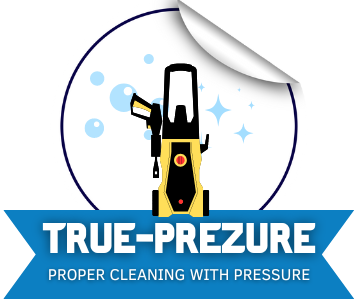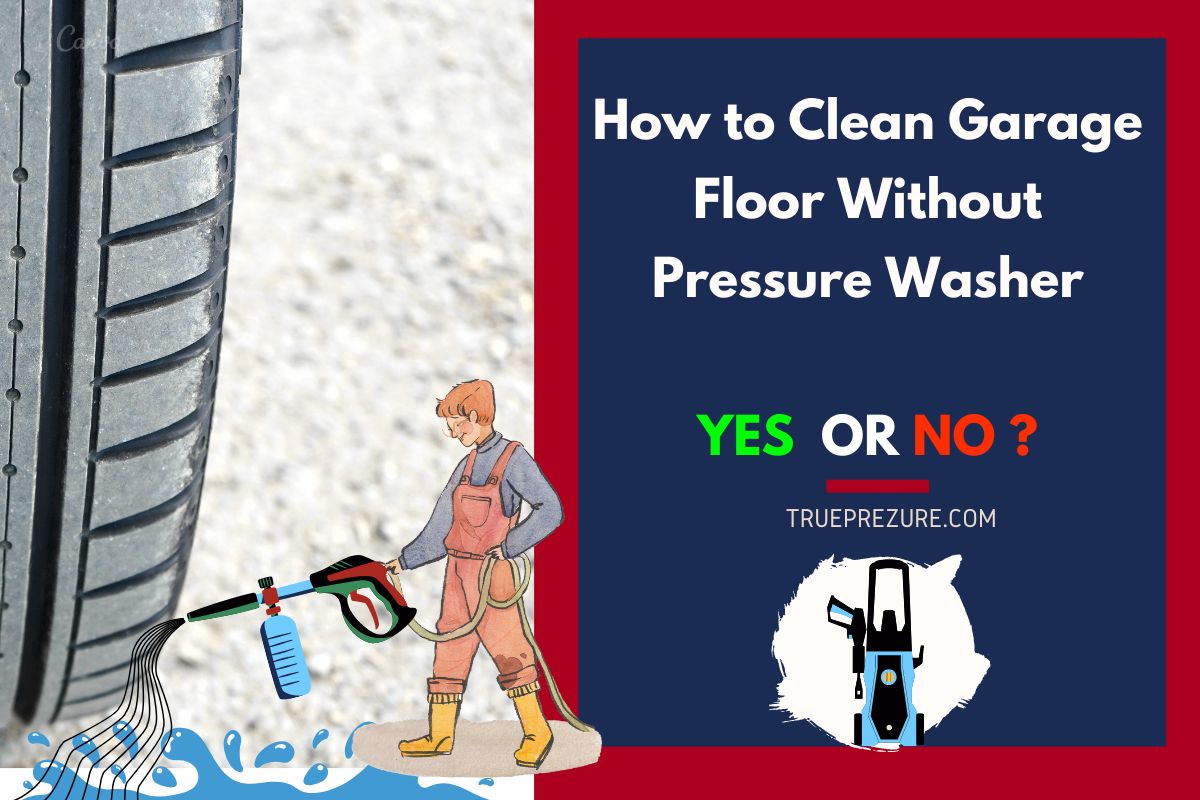Tackling the challenge of cleaning your garage floor, especially when faced with stubborn stains and dirt, doesn’t always demand a pressure washer. Although pressure washers are commonly employed for this task, they aren’t the sole solution or the most optimal one. Numerous everyday cleaning supplies and tools can effectively clean your garage floor without resorting to a pressure washer.
This blog post delves into diverse techniques on how to clean garage floor without pressure washer. By shedding light on the merits and limitations of each method, we aim to assist you in selecting the most suitable approach to cater to your specific requirements.
7 Genius Hacks for Cleaning Your Garage Floor Without a Pressure Washer!
Technique 1: Ammonia and Heated Water Mixture
An alternative successful approach for cleaning a garage floor without resorting to a pressure washer involves utilizing a mixture of ammonia and hot water. This technique proves particularly advantageous for effectively eliminating oil and grease stains from concrete surfaces.
To employ this method, combine half a cup of ammonia with one gallon of hot water. Immerse a mop into the solution and apply it to the floor, working in manageable sections. Give special consideration to spots with substantial stains or accumulated dirt, and employ a stiff-bristled brush for scrubbing if required. Conclude by rinsing the floor using fresh water and allowing it to air dry.

A notable benefit of employing this approach is its efficacy in eradicating grease and oil stains from concrete surfaces. Moreover, it presents an economical and user-friendly solution that doesn’t necessitate any specialized tools or equipment. Nevertheless, it’s crucial to exercise care when dealing with ammonia, as mishandling can pose hazards. Adequate ventilation in the garage is essential when utilizing this method to ensure safety.
Procedure 2: Creation of Paste Using Baking Soda and Water
Utilizing a paste made from baking soda and water is yet another successful approach for cleaning a garage floor without the need for a pressure washer. This technique proves effective in addressing mild to moderate stains and the accumulation of dirt on concrete surfaces.

To implement this method, combine equal measures of baking soda and water to form a consistent paste. Spread the paste onto the stained sections of the floor and allow it to rest for a minimum of 10 minutes. Employ a scrubber sponge or firm-bristled brush to scrub the surface, with particular focus on spots marked by stubborn stains or significant dirt accumulation. Conclude by rinsing the floor using fresh water and leaving it to air dry.
An inherent benefit of employing this method is the affordability and environmentally friendly nature of baking soda, which is a safe option for most garage floor types. Furthermore, its simplicity of use eliminates the need for specialized tools or equipment. Nonetheless, its effectiveness might be limited when facing challenging stains and extensive dirt buildup on heavily soiled floors.
Technique 3: Utilizing a Combination of Warm Water and Soap
One of the simplest and budget-friendly approaches to clean a garage floor in the absence of a pressure washer involves using a mixture of warm water and soap. This technique works well for minor stains and dirt, and only requires common household cleaning items.
Begin by combining any type of soap with warm water to produce a foamy solution. Apply the solution onto the floor using a mop, ensuring even coverage across the entire surface. For more stubborn stains, allow the solution to rest on the floor for a few minutes before using a firm-bristle brush to scrub. Conclude by rinsing the floor with fresh water and allowing it to air dry.
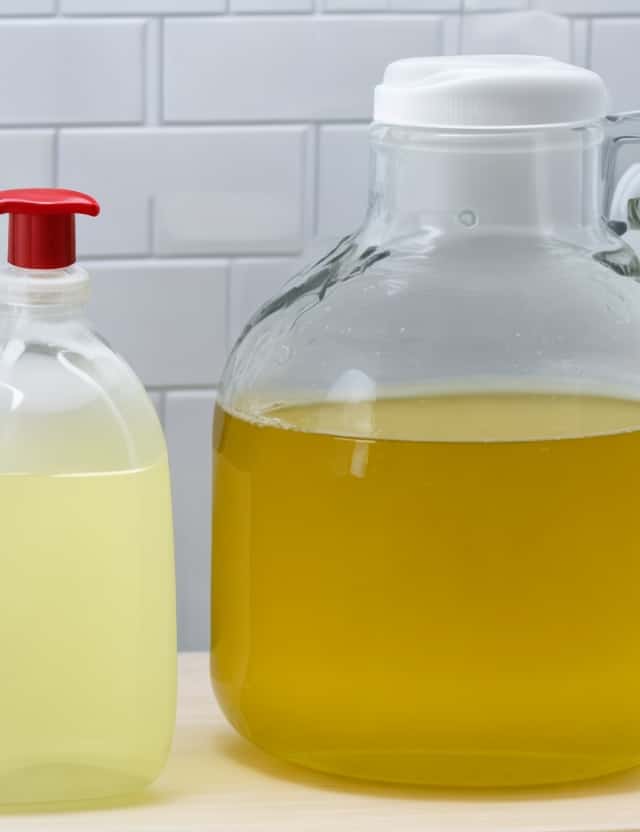
An appealing aspect of employing this technique lies in its affordability and user-friendliness. Nonetheless, its efficacy might be limited when confronting resilient stains or extensively soiled surfaces. Furthermore, an excess of soap application could result in a slippery residue on the floor, posing a potential hazard for walking.
Approach 4: Utilizing Simple Green Oxy Solve Concrete and Driveway Cleaner
An additional potent solution for cleaning garage floors without resorting to a pressure washer is the Simple Green Oxy Solve Concrete and Driveway Cleaner. This specialized cleaner is designed to efficiently eradicate grease, oil, and stubborn stains from concrete surfaces, rendering it a superb option for garage floors burdened with heavy soiling.
To utilize this cleaner, combine 2 cups of Simple Green Oxy Solve Concrete and Driveway Cleaner with 1 gallon of warm water. Immerse a stiff-bristled brush or push broom into the solution, then systematically scrub the floor in sections, with special focus on challenging stain spots. Subsequently, rinse the floor using fresh water and allow it to dry.
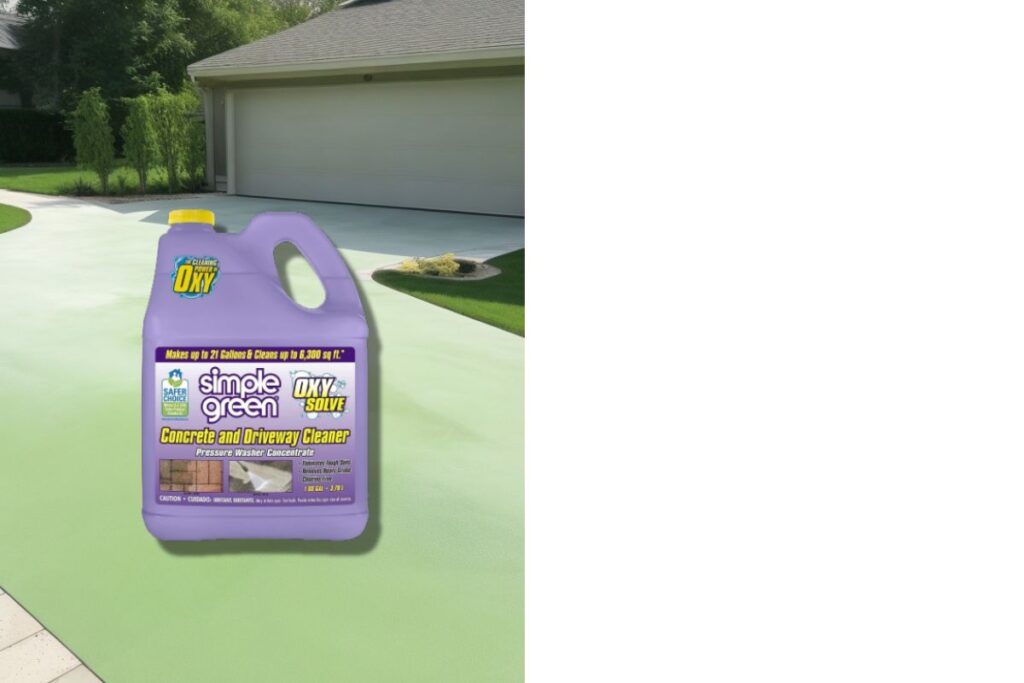
An inherent benefit of employing this approach is its remarkable effectiveness in eliminating stubborn stains and accumulated dirt. Moreover, the cleaner is environmentally conscious and compatible with the majority of garage floor materials. Nevertheless, it might be relatively less budget-friendly in comparison to alternative cleaning methods. Ensuring secure and efficient utilization mandates strict adherence to the manufacturer’s guidelines.
Methods 5: Use of WD-40
WD-40, a versatile lubricant, can also serve as a remedy for eradicating rust stains from a garage floor. Though unconventional for cleaning, it can effectively tackle persistent rust marks without relying on a pressure washer.
To apply this technique, generously spray WD-40 over the rust-affected region. Utilize an abrasive floor scrubber or brush to vigorously scrub the rust stain, lifting it from the floor. Wipe away any residual material using paper towels, and repeat the process if the stain persists.
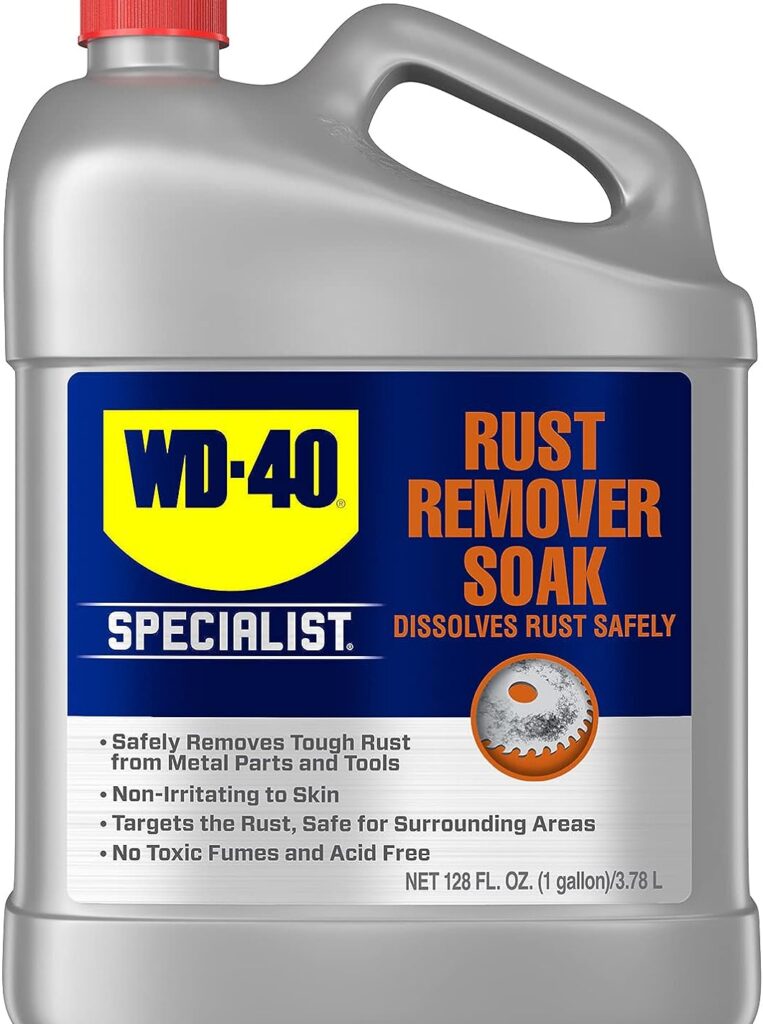
A notable advantage of this approach is its rapidity and ease in eliminating rust stains without the need for a pressure washer. Furthermore, WD-40 is a common household item that is both easily accessible and affordable. Nevertheless, its effectiveness might be restricted to rust stains and may not be applicable to other types of stains or dirt accumulation on the garage floor. Additionally, it could leave behind a slick residue, potentially creating a walking hazard.
Approach 6: Scrubbing with a Mixture of Detergent and Water
An alternative successful approach to cleanse a garage floor without resorting to a pressure washer involves employing a combination of detergent and water for thorough scrubbing. This method proves particularly advantageous for eradicating stubborn stains and eliminating accumulated dirt on concrete floors and surfaces.
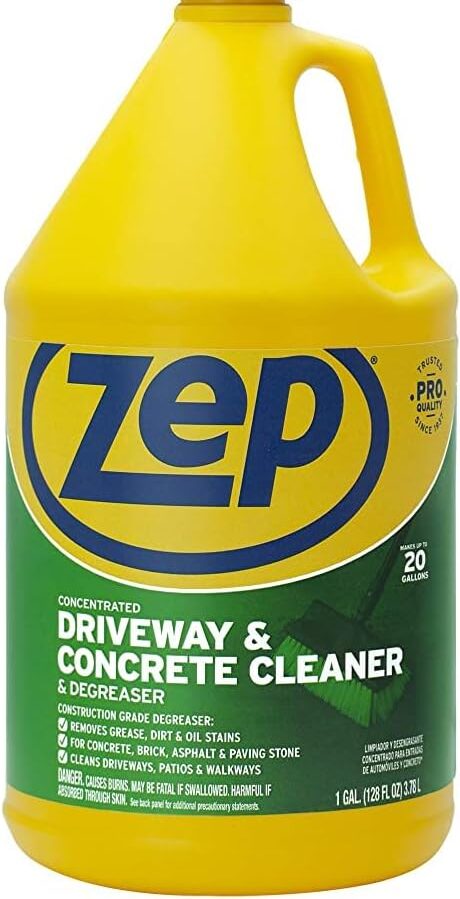
To implement this technique, blend a modest quantity of detergent with warm water, resulting in a soapy solution. Spread the solution across the garage floor and employ a firm-bristled brush or broom to vigorously scrub the surface, focusing on regions marked by stains or substantial dirt accumulation. Subsequently, rinse the floor using fresh water and allow it to dry.
An inherent benefit of employing this approach lies in its efficacy at eliminating stubborn stains and accumulated dirt. Nevertheless, it demands greater exertion and time in comparison to alternative methods and might not be universally applicable to all types of garage floors. Furthermore, excessive detergent usage could result in a lingering soapy residue, potentially causing a slippery and unsafe floor surface.
Approach 7: Employing a Garden Hose along with a Mop or Medium Bristle Deck Brush
Employing a garden hose along with a mop or a medium bristle deck brush constitutes a straightforward and efficient approach to cleaning a garage floor without utilizing a pressure washer. This method is well-suited for routine maintenance of garage floors and doesn’t entail the necessity of any specialized equipment or cleaning agents.
To utilize this approach, start by sweeping away loose debris from the garage floor using a broom and dustpan. Next, wet the surface of the floor using a garden hose. Immerse a mop or medium bristle deck brush into a bucket containing soapy water, and use it to scrub the floor’s surface. Be attentive to areas marked by substantial dirt accumulation or stains. Afterward, rinse the floor with clean water and allow it to air dry.
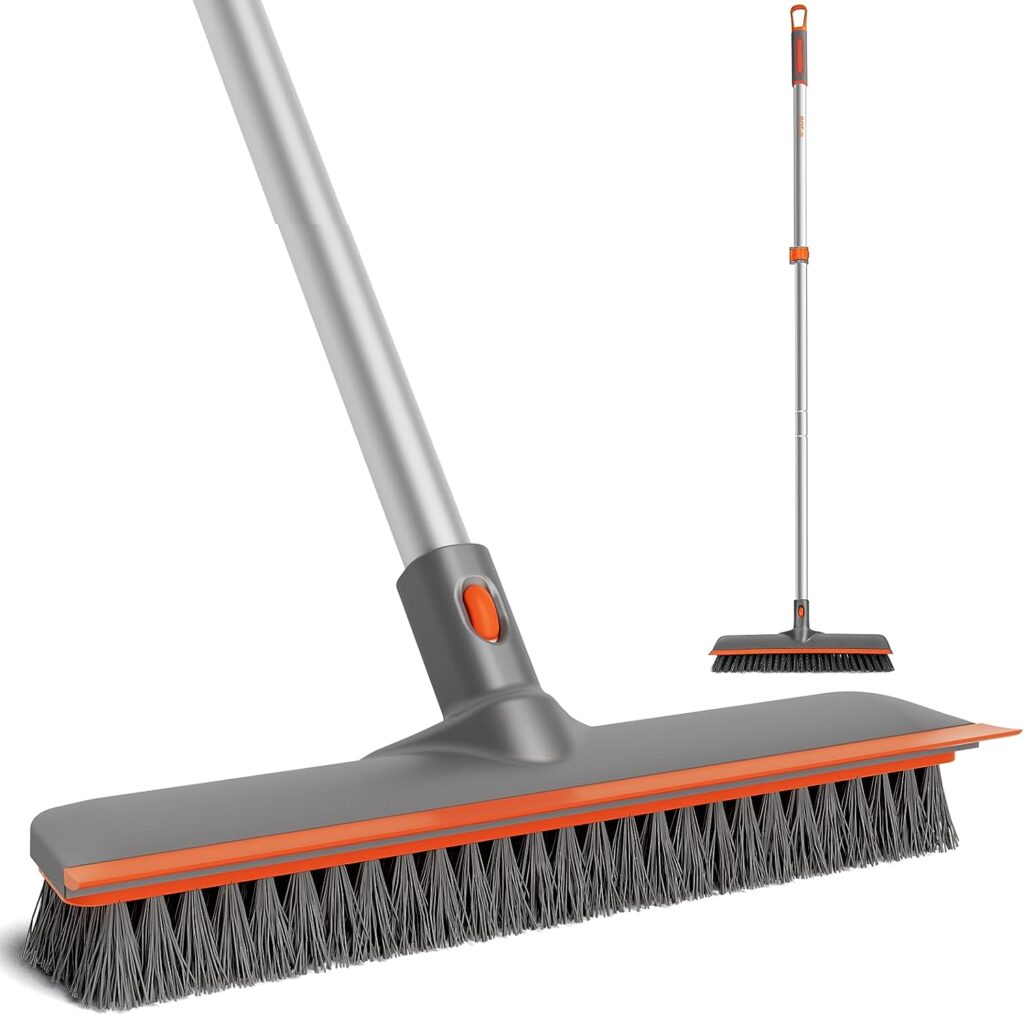
A notable benefit of this method lies in its affordability and simplicity, as it solely relies on basic cleaning supplies commonly found at home. Moreover, it is a secure and efficient technique that doesn’t carry any risk of causing damage to the garage floor. However, its efficacy might be limited when confronting stubborn stains or heavily soiled surfaces.
Faq
FAQ 1: Can I use ammonia and hot water mixture on all types of garage floors?
Yes, the ammonia and hot water mixture can be effective on various garage floor types, including concrete. However, it’s important to exercise caution and avoid using this mixture on sensitive surfaces like painted floors or surfaces with coatings that might react to ammonia. Always perform a patch test in an inconspicuous area before applying the mixture to the entire floor.
FAQ 2: Is baking soda safe to use on all garage floor materials?
Yes, baking soda is generally safe for most garage floor materials. It’s a mild abrasive that’s unlikely to cause damage. However, avoid using it on surfaces that are sensitive to abrasion, like polished concrete. For best results, test a small area first to ensure there’s no adverse reaction.
FAQ 3: Can I substitute dish soap for any type of soap in the warm water and soap method?
Yes, you can use dish soap as an alternative to other types of soap in the warm water and soap method. Dish soap is commonly used for cleaning purposes and should work well for this approach. Just be cautious not to use too much soap, as excess soap can create a slippery surface.
FAQ 4: Can I use WD-40 for cleaning purposes other than rust stains?
While WD-40 is primarily known as a lubricant and rust penetrant, it can indeed be used for cleaning purposes, particularly for removing rust stains. However, it might not be as effective for other types of stains or general cleaning tasks as specialized cleaning products. It’s recommended to use WD-40 specifically for rust stain removal and explore other methods for different cleaning needs.
In Summary,
these methods demonstrate that you can achieve a clean garage floor without a pressure washer by utilizing common household items and simple techniques. Whether it’s through ammonia and hot water, baking soda paste, warm water and soap, or specialized cleaners, maintaining a well-kept garage floor is both feasible and efficient. Always tailor your approach to your specific needs and floor type, and ensure safety by testing in small areas before full application.
